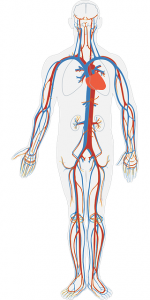
Heart failure does not mean that the heart has stopped working. It means that the heart is not pumping as much blood out to the rest of the body as it should. The consequence is that the body organs and tissues do not get as much oxygen and as many nutrients as they need. Clinical trials show that treatment with Coenzyme Q10 in addition to conventional heart failure medication is beneficial.
Adjunctive treatment of chronic heart failure patients with 3 times 100 milligrams of Coenzyme Q10 daily for two years gave the following significant results compared with placebo treatment [Mortensen 2014]:
- reduced number of deaths from heart disease
- reduced number of deaths from all causes
- reduced number of heart failure related hospitalizations
- improved NYHA class
Absorption and Bioavailability of the CoQ10 Supplement
CoQ10 supplements are very different from one another. The CoQ10 supplement that gave the beneficial heart health outcomes listed above is a specially formulated CoQ10 preparation, specially formulated with respect to the carrier oils in which the Coenzyme Q10 raw material is dispersed and with respect to the heating and cooling process used in the manufacture of the supplement. It has documented absorption and bioavailability.
Many, perhaps most, of the CoQ10 products for sale in Europe and the United States cannot be expected to give the same heart health benefits as were demonstrated in the Q-Symbio Study of the effect of Coenzyme Q10 on morbidity and mortality in chronic heart failure.
Coenzyme Q10 Difficult to Absorb
The CoQ10 raw material comes as a crystalline powder. The human body cannot absorb the CoQ10 crystals. The crystals must be dissociated in the manufacturing process to single CoQ10 molecules. The CoQ10 molecules themselves are large, fat-soluble molecules, too large to be absorbed via the capillary system directly into the blood. They must pass from the intestinal absorption cells to the lymph and then transit the lymph to reach the blood circulation.
Coenzyme Q10 for ATP Energy Generation and Antioxidant Protection
Once absorbed, Coenzyme Q10 provides antioxidant protection for lipoproteins in the blood plasma. When it reaches the tissue cells, Coenzyme Q10 plays an essential role in ATP energy generation and as an antioxidant neutralizing harmful free radicals.
Coenzyme Q10 for Management of Heart Failure
The results of a 2017 meta-analysis have shown that CoQ10 supplementation of heart failure patients was associated with significantly improved exercise capacity (indicating improved quality of life) and with significantly decreased mortality [Lei 2017].
Aggregated data in a 2013 meta-analysis of 13 randomized controlled trials has shown that CoQ10 treatment was associated with a small but significant improvement of ejection fraction and with a borderline improvement in NYHA class (p=0.06) [Fotino 2013].
Data from a 2013 Cochrane Database review has showed that CoQ10 supplementation lowered the rate of hospitalization and improved the NYHA class in heart failure patients [Madmani 2013].
Coenzyme Q10 for Management of Hypertension
Pooled data from a 2007 meta-analysis of 12 clinical trials has shown that Coenzyme Q10 supplementation lowered systolic blood pressure by up to 17 mm Hg and diastolic blood pressure by up to 10 mm Hg without significant side effects in hypertensive patients [Rosenfeldt 2007].
Coenzyme Q10 and Statin-Induced Muscle Pain and Weakness
A meta-analysis of data from 12 clinical trials has shown that statin medications of varying intensities and durations significantly decreased circulating CoQ10 concentrations [Qu 2018]. This occurs because the statin medication inhibits the bio-synthesis of Coenzyme Q10 in the same way that it inhibits the bio-synthesis of cholesterol [Okuyama 2015].
A meta-analysis of 12 randomized controlled trials has shown that, compared with placebo, CoQ10 supplementation significantly relieved statin-associated muscle symptoms: muscle pain, muscle weakness, muscle cramp, and muscle tiredness [Qu 2018].
Conclusion: Coenzyme Q10 for Heart Disease Prevention and Treatment
In the words of Dr. Mortensen, lead researcher on the Q-Symbio Study of adjuvant treatment of chronic heart failure patients with Coenzyme Q10: Coenzyme Q10 is safe, well-tolerated, effective, affordable.
And in the words of Dr. Lopez-Lluch, lead researcher on the Bioavailability of Coenzyme Q10 Supplements Study: Seven tested formulations showed large and significant differences in bioavailability.
Take-home message: Buying a cheap, undocumented CoQ10 supplement could be a waste of hard-earned money. A good documented CoQ10 supplement can improve the health-related quality of life.
Read our key article on CoQ10 as adjuvant therapy for heart failure
Sources
Fotino AD, Thompson-Paul AM, Bazzano LA: Effect of coenzyme Q10 supplementation on heart failure: a meta-analysis.; Am J Clin Nutr 2013 97 268-75
Lei L & Liu Y. Efficacy of coenzyme Q10 in patients with cardiac failure: a meta-analysis of clinical trials. BMC Cardiovascular Disorders, 2017. 17(1): 196.
López-Lluch G, Del Pozo-Cruz J, Sánchez-Cuesta A, Cortés-Rodríguez AB & Navas, P. Bioavailability of coenzyme Q10 supplements depends on carrier lipids and solubilization. Nutrition, 2019 57, 133–140.
Madmani ME, Yusuf Solaiman A, Tamr Agha K, Madmani Y: Coenzyme Q10 for heart failure.; Cochrane Database Syst Rev 2014 CD008684
Mortensen SA, Rosenfeldt F, Kumar A, Dolliner P & Littarru GP. The Effect of Coenzyme Q on Morbidity and Mortality in Chronic Heart FailureResults From Q-SYMBIO: A Randomized Double-Blind Trial; JACC Heart Fail 2014 641-9
Okuyama H, Langsjoen PH, Hamazaki T: Statins stimulate atherosclerosis and heart failure: pharmacological mechanisms; Expert Rev. Clin. Pharmacol. 2015 189-99
Qu H, Guo M, Chai H, Wang WT, et al.: Effects of Coenzyme Q10 on Statin-Induced Myopathy: An Updated Meta-Analysis ofRandomized Controlled; J Am Heart Assoc 2018 19 e009835
Rosenfeldt FL, Haas SJ, Krum H, Hadj A, et al.: Coenzyme Q10 in the treatment of hypertension: ameta-analysis of the clinical trials.; J Hum Hypertens. 2007 21 297-306.
The information contained in this review article is not intended as medical advice and should not be used as such.
25 June 2020








Leave A Comment